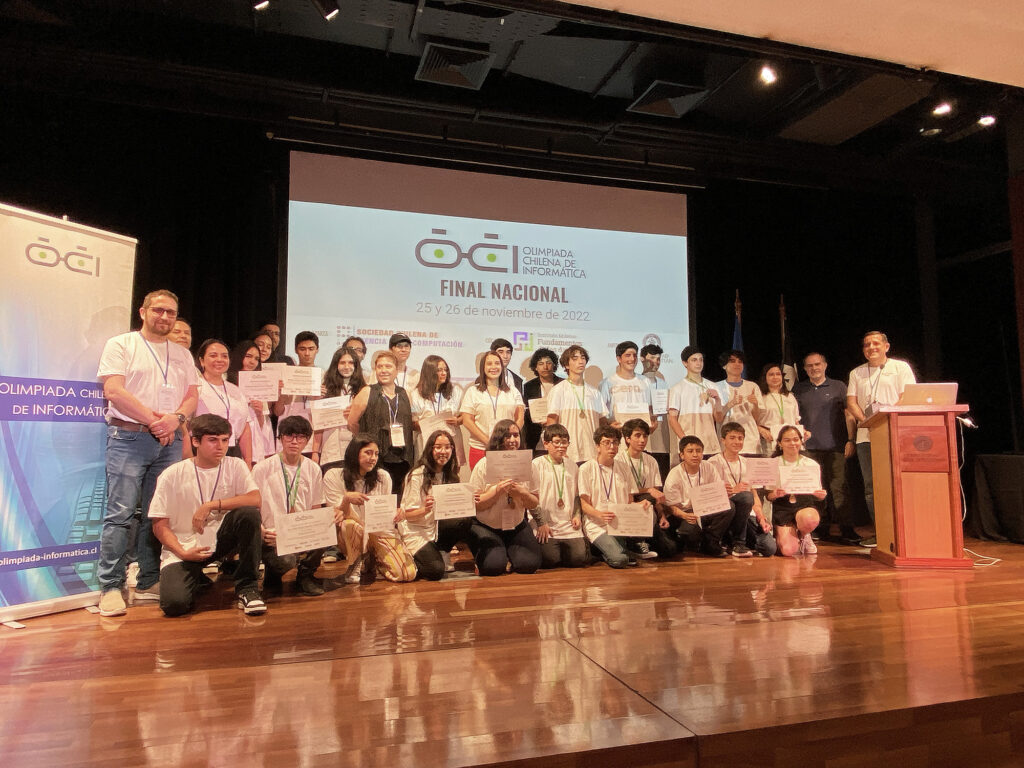Estudiantes de regiones del país arrasan en la Olimpiada Chilena de Informática 2022
Tras un año sumamente desafiante, el sábado 25 de noviembre se llevó a cabo la Final Nacional de la XI Olimpiada Chilena de Informática (OCI), la principal competencia de programación computacional en el país en la que participaron 25 estudiantes de 7º básico a 4º medio, de los cuales 35% fueron niñas.
Después de cuatro horas de competencia, emergieron los 10 campeones nacionales: seis Mellas de Bronce, tres Medallas de Plata y una Medalla de Oro. La gran diferencia de este año la constituye la gran presencia de estudiantes de regiones, quienes se llevaron cuatro de las seis distinciones, incluyendo la Medalla de Oro, obtenida por Matías Nova, estudiante del Liceo Bicentenario de Excelencia PolivalenteSan Nicolás, de la Región de Ñuble.
“Soy de Coelemu, un pueblo que está en la región de Ñuble, y no había participado antes en la OCI. Me enteré a principios de año gracias a un amigo que conocí en las Olimpiadas de Matemática y él me preparó un poco. Además, entrené a los talleres de OCI Labs Online”, señaló el campeón nacional.
Demostrando el incremento en la participación de mujeres en STEM, tres de las nueve niñas que compitieron en la final nacional obtuvieron Medalla de Bronce. “Es muy entretenido encontrarse con nuevas mujeres y más disidencias a medida que pasan los años en este tipo de actividades, te sientes mucho más acompañada”, expresó Paula Carrión, de Santiago, una de las medallistas.

En cuatro horas de competencia, las y los estudiantes deben solucionar cuatro problemas mediante programación computacional, preparados según los estándares internacionales de la Olimpiada Internacional de Informática (IOI). Estos pueden ir desde resolver con eficiencia problemas de distancia y tiempo, hasta encriptación y des-encriptación, entre otros.
“Estamos muy contentos, porque por fin pudimos volver a la presencialidad y as recuperar uno de los valores más importantes de la OCI: que las y los niños conozcan a más personas que tienen su mismo interés por la programación computacional y vivan juntos una nueva experiencia”, plantea Federico Meza, académico de la Universidad Técnica Federico Santa María y miembro del directorio de la Olimpiada Chilena de Informática. Meza destaca también que uno de los aprendizajes de la pandemia es haber mantenido los talleres online, lo que explica que niñas y niños de regiones hayan podido sumarse a la competencia junto con los que asistieron a talleres regionales en las sedes de distintas universidades a lo largo del país.
La OCI busca despertar el interés temprano en la computación y acercar el pensamiento computacional a las y los estudiantes. Su objetivo principal es descubrir y potenciar tempranamente a los jóvenes talentos y alentarlos a sumergirse en el mundo de la programación. La iniciativa es liderada por la Sociedad Chilena de Ciencia de la Computación y cuenta con la colaboración del Instituto Milenio Fundamentos de los Datos. Este año se contó con el apoyo de las empresas SOVOS, NTT DATA, CERO, Synopsys, y de la Universidad de Concepción.
Las 10 ganadoras y ganadores conforman ahora la Selección Nacional de Informática, equipo que se entrenará intensivamente para escoger a los cuatro representantes nacionales para la 35ª Olimpiada Internacional de Informática, a realizarse en Hungría en 2023.
MEDALLA DE ORO
Matías Nova Baza, Liceo Bicentenario Polivalente San Nicolás de Ñuble, Región de Ñuble
MEDALLAS DE PLATA
Matías Felipe Oteiza Vargas, The Greenland School, Santiago, Región Metropolitana
Javier Ignacio Calfuala Villa, Liceo Bicentenario Padre Alberto Hurtado, Loncoche, Región de La Araucanía
Guillermo Andrés Campos Fuentes, Centro Educacional Fernando de Aragón, Puente Alto, Región Metropolitana
MEDALLAS DE BRONCE
Paula Antonia Carrión Valdés, The Angels School, Ñuñoa, Región Metropolitana
Sofía Alejandra Muñoz Cordero, Liceo Bicentenario Técnico Las Nieves, Puente Alto, Región Metropolitana
Catalina Monserrat Isabel Díaz Cofré, Liceo N°7 Luisa Saavedra, Providencia, Región Metropolitana
Leandro Manuel Parada Contreras, San Fernando College, San Fernando, Región de O’Higgins
Edgardo Antonio León González, Colegio de los Sagrados Corazones de Providencia, Región Metropolitana
Juan Pablo Peñafiel Aguilera, Francis School, Coquimbo, Región de Coquimbo
